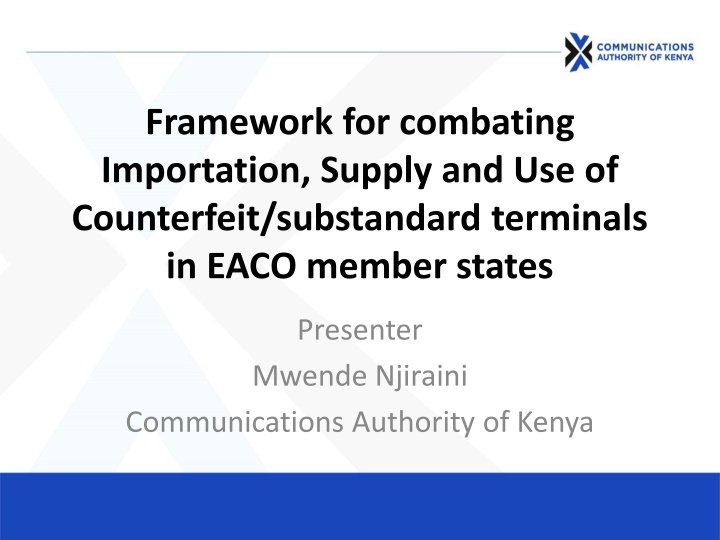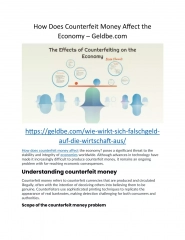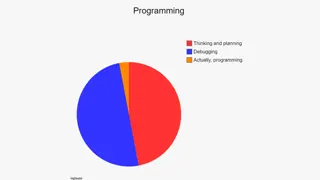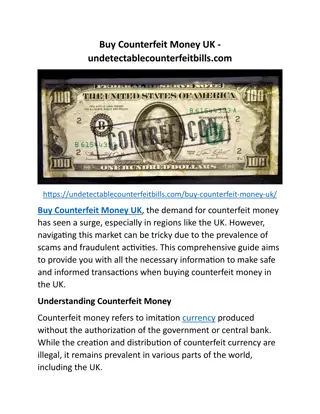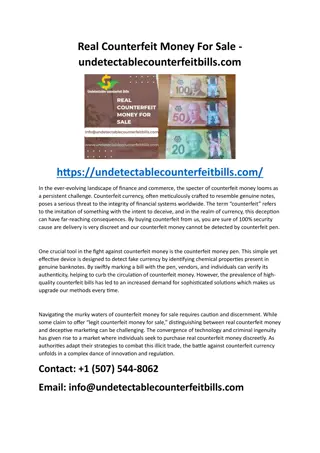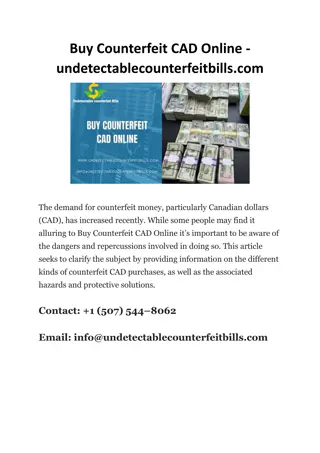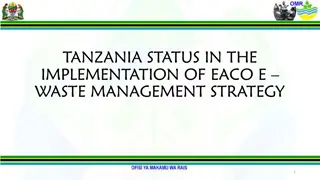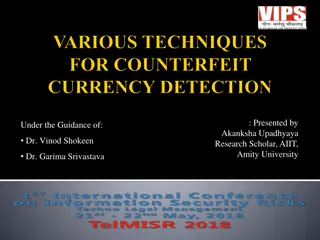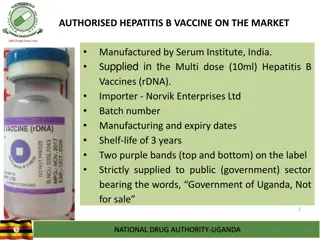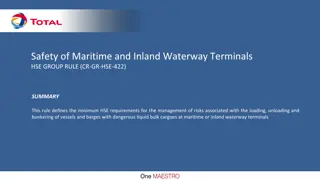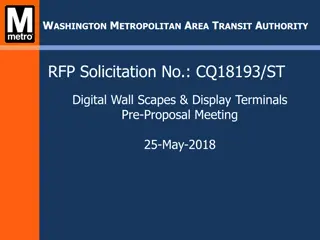Framework for Combatting Importation of Counterfeit Terminals in EACO Member States
This framework presentation by Mwende Njiraini from the Communications Authority of Kenya focuses on the definitions of counterfeit and substandard terminals, their impacts on industry, consumers, and governments, as well as proposed practical measures to combat the issue. It addresses challenges such as industry competition, safety risks to consumers, revenue loss for governments, and the need for implementing type approval and standards to safeguard the telecommunications industry and users.
Download Presentation

Please find below an Image/Link to download the presentation.
The content on the website is provided AS IS for your information and personal use only. It may not be sold, licensed, or shared on other websites without obtaining consent from the author.If you encounter any issues during the download, it is possible that the publisher has removed the file from their server.
You are allowed to download the files provided on this website for personal or commercial use, subject to the condition that they are used lawfully. All files are the property of their respective owners.
The content on the website is provided AS IS for your information and personal use only. It may not be sold, licensed, or shared on other websites without obtaining consent from the author.
E N D
Presentation Transcript
Framework for combating Importation, Supply and Use of Counterfeit/substandard terminals in EACO member states Presenter Mwende Njiraini Communications Authority of Kenya
Counterfeit Definition Any good including packaging, bearing without authorization a trademark which is identical to the trademark validly registered in respect to such goods or which cannot be distinguished in its essential aspects from such a trademark and which thereby infringes the rights of the owner of the trademark in question under the law of the country of importation
Substandard terminal definition A terminal that does not meet applicable national and international technical standards, conformity processes and national regulatory requirements or other legal requirements
Impact of counterfeit/substandard terminals Industry Competition with low cost counterfeit/substandard devices Payment of loyalties Lowering of quality of service on networks Disruption of supply chain
Impact of counterfeit/substandard terminals Consumers Exposure to high levels of hazardous substances Safety risk as not subjected to extensive testing Receive poor services receive sensitivity and transmit performance No warranty Not easily traceable -used to commit crime Short life span
Impact of counterfeit/substandard terminals Governments Lose of taxes use of informal routes Challenge in creating and enforcing laws Inflated regulatory cost manpower and collaborative effort to safeguard industry and consumers Electronic waste
Proposed Practical Measures 1. Implementation of type approval Define devices requiring type approval Define standards Determine whose responsible for technical evaluations Issuance of type approval certificate Affixing of type approval label Periodic inspections
Proposed Practical Measures Type approval challenges Country standards that do not have international benchmarks Cost of type approval Period for type approval process Lack of test centers Implementation of proposed type approval procedures
Proposed Practical Measures 2. International Mobile Station Equipment Identity (IMEI) database Requires membership to GSMA Check IMEI of mobile devices before importation and purchase
Proposed Practical Measures Challenges of implementing IMEI database Access to database by subscription Additional cost to the user Continuous consumer education Duplicate/cloned IMEI difficult to verify authenticity
Proposed Practical Measures 3. Implementation of International Mobile Subscriber Identity (IMSI) Every registered user has an original IMSI with a valid IMEI stored in their SIM Provides information of network operator, SIM card and location
Proposed Practical Measures Challenges of Implementation of IMSI SIM card registration not fully implemented Fraudsters can access SIM cards with invalid information IMSI considered confidential legal challenge in terms of access
Proposed Practical Measures 4. Equipment Identity Register (EIR) Matching of IMSI to IMEI Mandate all operators to have EIR database Challenges The EIR is a considerable investment The process of developing the EIR could take long to achieve accuracy and completeness Duplicate/cloned IMEI cannot be stopped Membership to GSMA
Proposed Practical Measures 5. Triple play approach Use of IMEI, IMSI and MSISDN Device locking rules A particular MSISDN/IMSI and particular IMEI locked to each other the MSISDN can only use the device of specified IMEI Lock IMEI to specific MSISDN/IMSI but MSISDN/IMSI can used with another IMEI Lock MSISDN/IMSI to specific IMEI but IMEI can be used by any subscriber (MSISDN/IMSI )
Proposed Practical Measures Triple play Benefits stops duplicate/cloned IMEI Provides for full tracking and security Encourages investment as governments can guarantee exclusive distribution rights No SIM boxing improved quality of international calls and increased revenue
Proposed Practical Measures Triple play benefits(cont d) Reduced device theft Can integrate with customs for tax collection Taxation application to specific types of devices such as luxury phones Governments can subsidize the cost of genuine phones Combat device smuggling
Proposed Practical Measures Challenges of triple play Expensive and requires close collaboration among stakeholders Technical expertise required to implement
Risk Analysis Competing political, commercial and technical interests Consumers not keen to acquiring and using genuine terminals
Responsibility Governments need to : Subsidize the cost of genuine terminals Ensure collaboration of stakeholders Ensure public awareness Invest in training of technical personnel
Situational Analysis Uganda Working committee to develop solution to deal with counterfeit/substandard terminals Equipment barring counterfeit/substandard terminals access to network purchased and housed at regulator (UCC)
Situational Analysis Tanzania Regulations on type approval in place TCRA conducts inspections Proposed set up of testing laboratory
Situational Analysis Kenya Anti counterfeit Act, 2008 and Type approval regulations, 2010 Switch off of 1.4 million devices with null or no IMEIs on 5 October 2012 Service provider for SMS (1555) IMEI verification Collaboration with Anti Counterfeit Agency, Kenya Bureau of Standards, Kenya Revenue Authority, Original Equipment Manufacturers and Mobile Network Operators
Situational Analysis Rwanda Type approval procedure in place RURA in process of acquiring SMS platform to interrogate GSMA database
Situational Analysis Burundi Legislation Decree 1/011 of 1997, Decree 100/97 of 2014 ARCT identified technical partner to set up solution to fight counterfeit/substandard devices Technical and financial feasibility established before signing of contract
